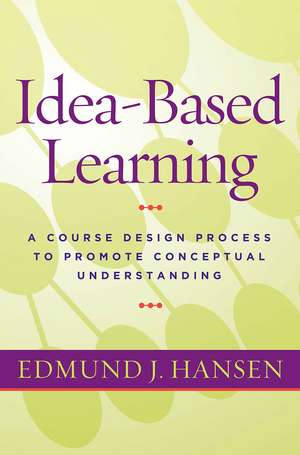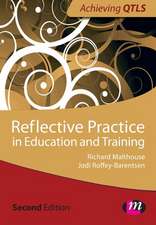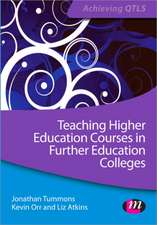Idea-Based Learning: A Course Design Process to Promote Conceptual Understanding
Autor Edmund J. Hansenen Limba Engleză Paperback – 17 oct 2011
| Toate formatele și edițiile | Preț | Express |
|---|---|---|
| Paperback (1) | 258.63 lei 6-8 săpt. | |
| Taylor & Francis – 17 oct 2011 | 258.63 lei 6-8 săpt. | |
| Hardback (1) | 1000.27 lei 6-8 săpt. | |
| Taylor & Francis – 10 oct 2011 | 1000.27 lei 6-8 săpt. |
Preț: 258.63 lei
Nou
Puncte Express: 388
Preț estimativ în valută:
49.50€ • 53.79$ • 41.61£
49.50€ • 53.79$ • 41.61£
Carte tipărită la comandă
Livrare economică 21 aprilie-05 mai
Preluare comenzi: 021 569.72.76
Specificații
ISBN-13: 9781579226145
ISBN-10: 1579226140
Pagini: 226
Dimensiuni: 152 x 229 x 28 mm
Greutate: 0.31 kg
Ediția:New.
Editura: Taylor & Francis
Colecția Routledge
Locul publicării:Oxford, United Kingdom
ISBN-10: 1579226140
Pagini: 226
Dimensiuni: 152 x 229 x 28 mm
Greutate: 0.31 kg
Ediția:New.
Editura: Taylor & Francis
Colecția Routledge
Locul publicării:Oxford, United Kingdom
Public țintă
Postgraduate and Professional Practice & DevelopmentCuprins
1. Practical Benefits of Course Design Faculty Stressors in Teaching Benefits From Idea-based Course Design 2. Backward Design Traditional Course Design Critique of the Traditional Design The Backward Design Model The Importance of Course Design 3. Learning Outcomes Problems With (Conceptualizing. Learning Outcomes Identifying Big Ideas Deriving Enduring Understandings Determining Learning Outcomes 4. Critical Thinking Significance of Critical Thinking Lay Definitions of Critical Thinking The Confusing State of the Critical Thinking Literature Need for Teaching Critical Thinking Barrier 1. Intellectual Development Barrier 2. Habits of Mind Barrier 3. Misconceptions Barrier 4. Complex Reasoning Conclusion 5. Content, Part 1. Guiding Questions and Concepts Topics Two parts of Course Content Essential Questions Guiding Concepts Course Content and Critical Thinking 6. Assessment, Part 1. Educative Assessment Assessment for Grading Assessment for Learning A Continuum of Assessments Assessment as Coaching Principles of Assessing for Understanding 7. Assessment, Part 2. Rubrics Examples of Assignments Lacking Clear Criteria The Main Parts of a Rubric Sample Rubric. Critical Thinking Common Misunderstandings About Rubrics The Triple Function of Rubrics 8. Content, Part 2. Learning Experiences Examples of Poor Assignments Authentic Performance Tasks Assignment-Centered Instruction Assignment-Related Competencies Building Block Designs Principles for Designing Effective Learning Experiences Student Involvement in the Pedagogy 9. Course Design Document Why Create Course Design Documents? Elements of the Course Design Document Sample Design Document. Psychology 624 - Theories of Motivation Summary of Course Design Features and Benefits Translating the Course Design Document Into a Syllabus 10. Implementing Course Design With Online Technology Key Characteristics of Online Teaching Course Design Elements Enhanced by Online Technology Conclusion References Appendix Syllabus for PY-624:Theories of Motivation Course
Notă biografică
Edmund J. Hansen has been the director of the Center for Teaching and Learning at Northeastern Illinois University since its inception in 2001. Before joining NEIU, he worked in faculty development for over twelve years, half of that time at Indiana University in Bloomington, and the other half at Emporia State University in Kansas. In Emporia, he was the founding director of the Teaching Enhancement Center and also an assistant professor in the psychology department. For seven years, Edmund served as President of the Chicago Area Faculty Development Network (CAFDN), a consortium of faculty development offices at both two and four-year institutions in the region. He has published articles and book chapters related to the improvement of college teaching, including the integration of instructional technology into the classroom. He is originally from Germany, where he worked in adult education. Edmund has a PhD in Educational Psychology from Indiana University, and Masters Degrees from the University of Pennsylvania and from the University of Aachen, Germany.
Recenzii
"For Scholars of religious studies and philosophy, Idea-Based Learning has much to commend it. It is not directed towards any specific discipline; instead, Hansen has included examples from across the curriculum. Hansen's book is readable and thought-provoking. It does not bog down the reader with excessive theory or debate, but rather seeks to be a concise guidebook for course design. It is an excellent starting point for new teachers, while also offering something to those more seasoned in the classroom. Finally, his work provides enough context that the reader is encouraged to move beyond this particular work in order to gain further depth into one's own reflection on teaching."
Forrest Clingerman, Ohio Northern University
Teaching Theology & Religion
"Marr and Forsyth have written a very accessible and readable volume, one that is brief and yet comprehensive enough to adequately introduce the reader to the subject. Further, the explanations of the current milieu of higher education in the U.K. as well as the role of academics within this are lucid and helpful. those who are considering entering the world of higher education in England, Scotland, Wales, or Northern Ireland will certainly find this book valuable, particularly those interested in a career in teaching. Indeed, those considering postgraduate study in the U.K. may also wish to consult this volume, as it helpfully describes the lay of the academic landscape."
Bradford A. Anderson, M
Teaching Theology & Religion
"A guide to course design that emphasizes a starting point of big conceptual ideas within a discipline."
The Chronicle of Higher Education
“Much of course design consists of stringing together related topics in a linear fashion. This excellent book shows how to identify one or two central ideas and organize the course around them, so that topic selection, teaching practices, and assessments all converge to advance attainment of those ideas, and deep learning, improved critical thinking, and other valued skills emerge naturally as outcomes. Full of examples and practical suggestions, it provides invaluable step-by-step guidance that will benefit both novice and veteran teachers.”
Mano Singham, author of God vs. Darwin: The War Between Evolution and Creationism in the Classroom and Director, University Center for Innovation in Teaching and Education
Case Western Reserve University
“In Idea-Based Learning Edmund Hansen shows faculty how college courses need to be designed! Hansen has the blueprint we all need to follow if we are to put together courses that will produce meaningful and long-lasting learning for our students."
Terry Doyle is the Chief Instructor for Faculty Development and Coordinator of the New Faculty Transition Program, Faculty Center for Teaching & Learning
Ferris State University
Forrest Clingerman, Ohio Northern University
Teaching Theology & Religion
"Marr and Forsyth have written a very accessible and readable volume, one that is brief and yet comprehensive enough to adequately introduce the reader to the subject. Further, the explanations of the current milieu of higher education in the U.K. as well as the role of academics within this are lucid and helpful. those who are considering entering the world of higher education in England, Scotland, Wales, or Northern Ireland will certainly find this book valuable, particularly those interested in a career in teaching. Indeed, those considering postgraduate study in the U.K. may also wish to consult this volume, as it helpfully describes the lay of the academic landscape."
Bradford A. Anderson, M
Teaching Theology & Religion
"A guide to course design that emphasizes a starting point of big conceptual ideas within a discipline."
The Chronicle of Higher Education
“Much of course design consists of stringing together related topics in a linear fashion. This excellent book shows how to identify one or two central ideas and organize the course around them, so that topic selection, teaching practices, and assessments all converge to advance attainment of those ideas, and deep learning, improved critical thinking, and other valued skills emerge naturally as outcomes. Full of examples and practical suggestions, it provides invaluable step-by-step guidance that will benefit both novice and veteran teachers.”
Mano Singham, author of God vs. Darwin: The War Between Evolution and Creationism in the Classroom and Director, University Center for Innovation in Teaching and Education
Case Western Reserve University
“In Idea-Based Learning Edmund Hansen shows faculty how college courses need to be designed! Hansen has the blueprint we all need to follow if we are to put together courses that will produce meaningful and long-lasting learning for our students."
Terry Doyle is the Chief Instructor for Faculty Development and Coordinator of the New Faculty Transition Program, Faculty Center for Teaching & Learning
Ferris State University
Descriere
Synthesizing the best current thinking about learning, course design, and promoting student achievement, this is a guide to developing college instruction that has clear purpose, is well integrated into the curriculum, and improves student learning in predictable and measurable ways.














